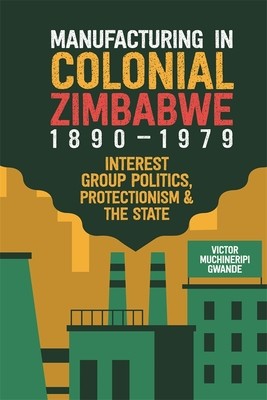
- We will send in 10–14 business days.
- Author: Victor Muchineripi Gwande
- Publisher: James Currey
- ISBN-10: 1847013333
- ISBN-13: 9781847013330
- Format: 15.6 x 23.4 x 1.6 cm, kieti viršeliai
- Language: English
- SAVE -10% with code: EXTRA
Manufacturing in Colonial Zimbabwe, 1890-1979 (e-book) (used book) | bookbook.eu
Reviews
Description
A key book on Zimbabwe's industrial policy and the relationship between manufacturing, the state, and economic interest groups.
Under pressure from local manufacturers, and recognising that industrial policy was a legitimate instrument for development, on 1 July 2016, to boost domestic production, the Government of Zimbabwe passed Statutory Instrument 64 which limited imports and foreign manufactures, allowing local producers satisfy demand. Zimbabwe's neighbours immediately protested that this flouted the Southern Africa Development Community (SADC)'s Protocol on Trade, which aimed to increase trade across borders at regional and national levels. This matter revived the conversation about protectionism as an instrument of industrial policy. Protectionism in Africa is neither limited to Zimbabwe, nor is it a new phenomenon.This book brings a historical perspective to the conversation by exploring the policy proposals and political pressure exerted by manufacturing businesses on the trajectory of industrialisation in colonial Zimbabwe, and reveals that the major point of contention between the state, industry, and other economic interest groups in this period was protection. Tracing changing attitudes to the country's political economy, the author examines the way in which industrialists advanced their interests through the Association of Rhodesian Industries (ARnI) and other trade bodies, and shows how this pitted them not only against the state but other blocs of capital - farmers, miners and commerce. He examines the impact of the post-war Customs Union Agreement with South Africa, manufacturing strategy under UDI, and examines the impact of Southern Rhodesia's development on its trading partners in South Africa, Zambia and Malawi. Casting new light on the continuing debate on regional trade, this important book adds to our understanding of the settler colony's economic, business, and political history.
EXTRA 10 % discount with code: EXTRA
The promotion ends in 22d.05:04:07
The discount code is valid when purchasing from 10 €. Discounts do not stack.
- Author: Victor Muchineripi Gwande
- Publisher: James Currey
- ISBN-10: 1847013333
- ISBN-13: 9781847013330
- Format: 15.6 x 23.4 x 1.6 cm, kieti viršeliai
- Language: English English
A key book on Zimbabwe's industrial policy and the relationship between manufacturing, the state, and economic interest groups.
Under pressure from local manufacturers, and recognising that industrial policy was a legitimate instrument for development, on 1 July 2016, to boost domestic production, the Government of Zimbabwe passed Statutory Instrument 64 which limited imports and foreign manufactures, allowing local producers satisfy demand. Zimbabwe's neighbours immediately protested that this flouted the Southern Africa Development Community (SADC)'s Protocol on Trade, which aimed to increase trade across borders at regional and national levels. This matter revived the conversation about protectionism as an instrument of industrial policy. Protectionism in Africa is neither limited to Zimbabwe, nor is it a new phenomenon.This book brings a historical perspective to the conversation by exploring the policy proposals and political pressure exerted by manufacturing businesses on the trajectory of industrialisation in colonial Zimbabwe, and reveals that the major point of contention between the state, industry, and other economic interest groups in this period was protection. Tracing changing attitudes to the country's political economy, the author examines the way in which industrialists advanced their interests through the Association of Rhodesian Industries (ARnI) and other trade bodies, and shows how this pitted them not only against the state but other blocs of capital - farmers, miners and commerce. He examines the impact of the post-war Customs Union Agreement with South Africa, manufacturing strategy under UDI, and examines the impact of Southern Rhodesia's development on its trading partners in South Africa, Zambia and Malawi. Casting new light on the continuing debate on regional trade, this important book adds to our understanding of the settler colony's economic, business, and political history.


Reviews